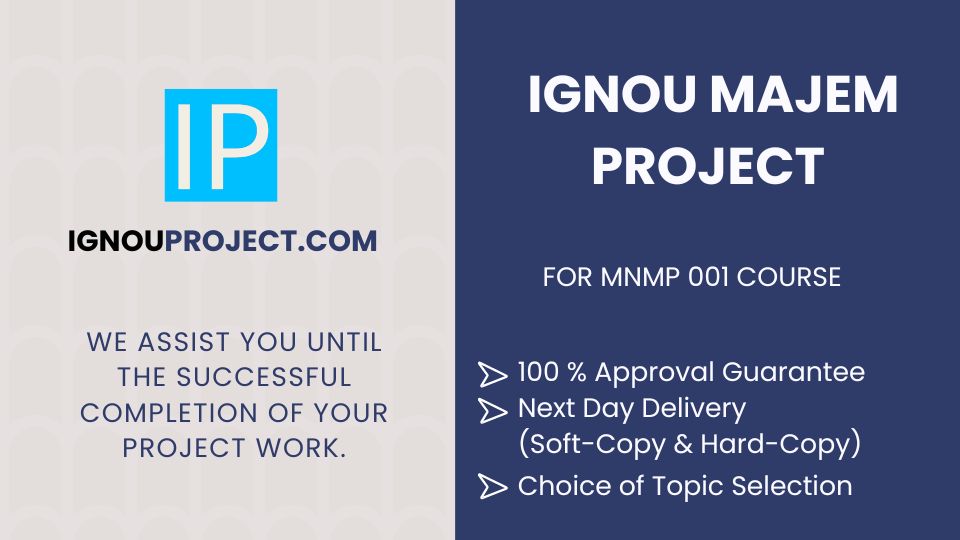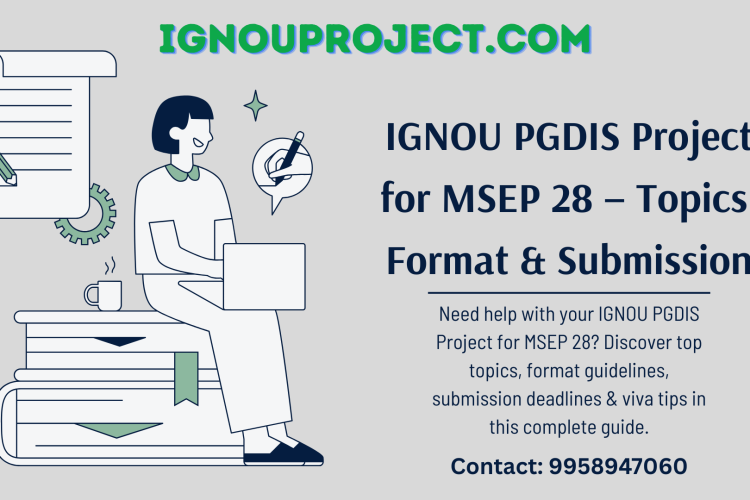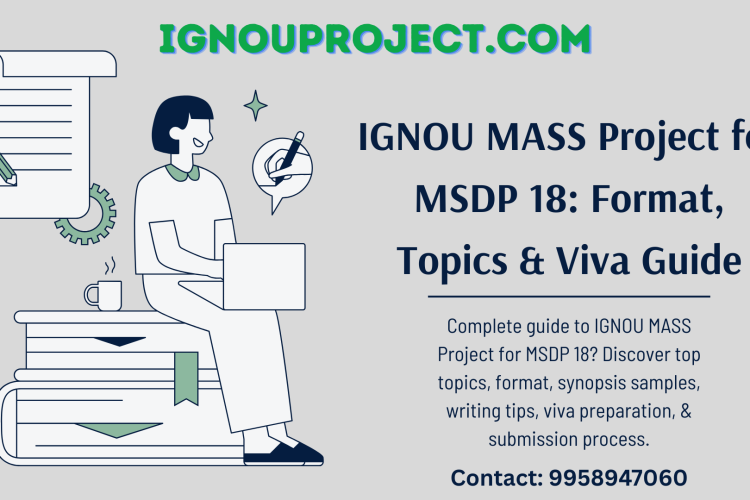
The IGNOU MAJEM Project (MNMP 001) stands for Master of Arts in Journalism and Electronic Media Project. The IGNOU MAJEM Project is designed to assess your ability to apply the theoretical knowledge and skills gained throughout the course to real-world scenarios in electronic and digital journalism.
Whatsapp us to get the Personalized (Customized) IGNOU MAJEM Project Report and Synopsis
Download PDF Link for IGNOU MAJEM Project for MNMP 001
When should you start working on your IGNOU MAJEM Project?
- Select a topic: Choosing a research topic can take time as you need to consider your interests, the relevance of the topic, its feasibility, and its alignment with your academic and career goals.
- Conduct a literature review: Conducting a thorough literature review is essential to understand existing research in your chosen area and to identify gaps or areas for further exploration.
- Plan your research: Once you’ve identified your research topic, you need to develop a research plan, including defining research questions or hypotheses, selecting appropriate research methods, and designing data collection instruments (if applicable).
- Collect and analyze data: Depending on your research methodology, data collection and analysis can be time-consuming processes. Starting early gives you the opportunity to gather data systematically and analyze it thoroughly.
- Write and revise: Writing the MAJEM project report or thesis requires careful attention to detail, organization, and clarity of expression. Starting early allows you to draft, revise, and refine your writing over time, ensuring a high-quality final document.
Sample of Topics for IGNOU MAJEM Project
- A Study of Impact of Media on Body Image and Eating Disorder among Female College Students
- Effect of Social Media on Body Image and Adjustment Level of Adolescent
- Relationship between Social Media Addiction and Personality Development among Students
- Social Media Addiction and Social Skill of Male and Female Students Pursuing Higher Education
- A Study of Impact of Media on Body Image and Eating Disorder among Female College Students
What are the steps involved in completing the IGNOU MAJEM Project?
- Topic Selection: Identify a research topic that interests you and aligns with the objectives of your MNMP 001 program. Ensure the topic is relevant, feasible, and contributes to the existing body of knowledge in Journalism and Electronic Media.
- Literature Review: Conduct a comprehensive literature review to familiarize yourself with existing research, theories, and perspectives related to your chosen topic. Identify gaps, controversies, or areas for further investigation.
- Research Design: Define your research questions or hypotheses based on the gaps identified in the literature review. Select appropriate research methods and techniques for data collection and analysis. Develop a research plan outlining the steps you’ll take to address your research objectives.
- Data Collection: Depending on your research design, collect data using various methods such as surveys, interviews, content analysis, or observation. Ensure that your data collection procedures are ethical and systematic.
- Data Analysis: Analyze the collected data using suitable analytical techniques or software. Interpret the findings in relation to your research questions or hypotheses. Ensure that your analysis is rigorous and objective.
- Results Presentation: Present your research findings clearly and concisely. Use tables, charts, graphs, or other visual aids to enhance understanding. Discuss the implications of your results and how they contribute to the existing knowledge in the field.
- Discussion and Conclusion: Discuss the significance of your findings in relation to the broader context of Journalism and Electronic Media. Address any limitations of your study and suggest avenues for future research. Summarize your key findings and conclusions.
- Writing the Project Report: Write a structured project report or thesis following the guidelines provided by your university or department. Include sections such as introduction, literature review, methodology, results, discussion, conclusion, and references. Ensure that your writing is clear, coherent, and well-organized.
- Review and Revision: Review your MNMP 001 project report carefully for accuracy, clarity, and coherence. Revise as needed to improve the quality of your writing and presentation. Seek feedback from your faculty advisor or supervisor and incorporate their suggestions.
- Final Submission: Prepare the final version of your project report according to the specified format and guidelines. Submit it to your university or department by the deadline. Ensure that all necessary documentation, such as consent forms or ethical clearance certificates, is included.
Do you need to conduct primary research for your IGNOU MAJEM Project?
Whether you need to conduct primary research for your MAJEM project depends on various factors, including the nature of your research topic, the objectives of your project, and the requirements of your university or department.
Nature of the Research Topic:
Some research topics may lend themselves well to primary research, where you collect new data directly from sources such as surveys, interviews, experiments, or observations. For example, if your project aims to investigate public perceptions of media ethics or the effectiveness of a particular communication campaign, you may need to gather primary data from relevant stakeholders.
Objectives of the Project:
Consider the specific research objectives of your MAJEM project. If your goal is to generate new insights, test hypotheses, or explore phenomena in-depth, primary research may be necessary to achieve these objectives. Primary research allows you to collect data tailored to your research questions and provides opportunities for original contributions to knowledge.
Requirements of Your University or Department:
Review the guidelines provided by your university or department for the MAJEM project. They may specify whether primary research is required or optional, depending on the academic standards and expectations of the program. Some programs may prioritize original research and encourage or mandate primary data collection as part of the project.
Feasibility and Resources:
Consider the feasibility of conducting primary research within the constraints of time, budget, access to participants, and ethical considerations. Primary research can be resource-intensive and may require careful planning and coordination. Evaluate whether you have the necessary resources and support to carry out primary data collection effectively.
Alternatives to Primary Research:
If primary research is not feasible or appropriate for your project, you may consider alternative research methods, such as secondary data analysis, content analysis, case studies, or literature-based research. These approaches involve analyzing existing data, documents, or texts to address your research questions and contribute new insights to the field.
What is the word count requirement for the IGNOU MAJEM Project?
The word count requirement for the MNMP 001 project at IGNOU typically ranges from 8,000 to 15,000 words, excluding references, appendices, and other supplementary materials. However, specific requirements can vary depending on the guidelines provided by your department or program.
Steps to Ensure Compliance with Word Count Requirements:
- Consult the Guidelines: Always refer to the official project guidelines provided by IGNOU or your specific department. These guidelines will detail the expected word count and any other formatting requirements.
- Check with your supervisor. Confirm the word count expectations with your project supervisor. They can provide clarity and ensure you meet the academic standards set by the program.
- Plan Your Content: Organize your project report into sections such as introduction, literature review, methodology, results, discussion, conclusion, and references. Allocate word counts to each section to help manage the overall length of your report.
- Edit and Refine: After drafting your report, review and edit it to ensure it fits within the required word count. Focus on clarity, conciseness, and relevance to avoid unnecessary verbosity.
What ethical considerations you should keep in mind for your IGNOU MAJEM Project?
Here are the key ethical considerations you should keep in mind:
1. Informed Consent:
- Description: Participants should be fully informed about the purpose, methods, risks, and benefits of the research before agreeing to take part.
- Action: Provide a detailed consent form and ensure participants understand it. Consent should be voluntary, and participants should have the right to withdraw at any time without penalty.
2. Confidentiality and Anonymity:
- Description: Protect the privacy of participants by keeping their data confidential and ensuring their anonymity where applicable.
- Action: Use pseudonyms or codes instead of real names, and store data securely. Ensure that personal identifiers are not disclosed in your reports or publications.
3. Avoiding Harm:
- Description: Ensure that your research does not cause physical, psychological, or emotional harm to participants.
- Action: Conduct a risk assessment to identify potential harms and take steps to mitigate them. Be sensitive to participants’ well-being and ready to provide support if needed.
4. Ethical Approval:
- Description: Obtain approval from an ethics review board or committee before commencing your research, especially if it involves human subjects.
- Action: Submit a detailed research proposal outlining your methodology and ethical considerations to the relevant ethics committee at your institution.
5. Honesty and Transparency:
- Description: Be honest and transparent in your research practices, including data collection, analysis, and reporting.
- Action: Avoid fabrication, falsification, and selective reporting of data. Present your findings truthfully and acknowledge any limitations or potential biases.
6. Plagiarism:
- Description: Present original work and give proper credit to the sources of information and ideas that are not your own.
- Action: Use plagiarism detection tools, cite all sources correctly, and ensure your work is free from copied content. Observe the citation style that your institution specifies.
7. Respect for Participants:
- Description: Treat all participants with respect and dignity, regardless of their background or status.
- Action: Be culturally sensitive, avoid coercion, and ensure that participation is entirely voluntary. Show appreciation for their contribution to your MAJEM research.
8. Data Management:
- Description: Handle research data responsibly from collection to storage to sharing.
- Action: Store data securely (e.g., encrypted digital files, locked physical storage), limit access to authorized personnel, and ensure data is properly disposed of when no longer needed.
9. Conflict of Interest:
- Description: Disclose any potential conflicts of interest that may affect the research.
- Action: Be transparent about any financial, personal, or professional relationships that could influence your research. Address any conflicts in an ethical manner.
10. Intellectual Property:
- Description: Respect the intellectual property rights of others and clarify the ownership of your research findings.
- Action: Ensure that any collaborative work is properly attributed, and seek permission if using proprietary tools or datasets. Clarify the ownership of data and findings with co-researchers and participants.
11. Accurate Reporting:
- Description: Report your research findings accurately and completely, without omitting significant results.
- Action: Present data in an unbiased manner, discuss the implications honestly, and avoid misrepresenting your research.
12. Debriefing:
- Description: Provide participants with a debriefing session to explain the research outcomes and address any questions or concerns.
- Action: After data collection, inform participants about the study’s findings and purposes, and offer them a chance to ask questions or express concerns.
Ready to get your IGNOU MAJEM Project Report and Synopsis Sample PDF for MNMP 001?
- Call us or WhatsApp us at: 9958947060, 9354637830
- Visit: IGNOUPROJECT.COM
- Check Out: Project

